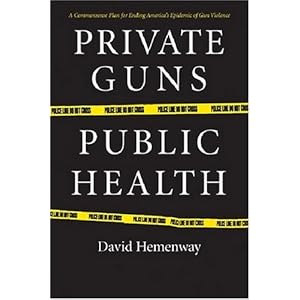This past weekend, an unspeakable act of violence was committed against a group of innocent Americans at a grocery store in Tucson, AZ. The incident has sparked off another series of debates regarding gun control and finger-pointing about who is to blame for this particular incident. While this act of terrorism deserves all of the media attention it is currently receiving, it is important to realize that firearms are responsible for tens of thousands of deaths every year in the United States, most of which do not make national headlines. Firearm injuries are an important public health problem in the United States and therefore this incident should also be viewed as our failure to implement the best evidence-based policies that we know can help save lives.
My advisor during my masters at the Harvard School of Public Health, David Hemenway, is perhaps the world's leading expert on the public health approach to reducing mortality and morbidity from firearms. He has authored an excellent book on this topic "Private Guns, Public Health" - which I would encourage anyone interested in public health to read, not just those interested in firearm injury prevention.

I quote from the preface to this book:
Also from David Hemenway's book preface:
My advisor during my masters at the Harvard School of Public Health, David Hemenway, is perhaps the world's leading expert on the public health approach to reducing mortality and morbidity from firearms. He has authored an excellent book on this topic "Private Guns, Public Health" - which I would encourage anyone interested in public health to read, not just those interested in firearm injury prevention.

I quote from the preface to this book:
"...motor vehicles and firearms are the leading agents of injury death in the United States, with vehicles first and guns a close second. But while motor vehicles are used by almost everyone, every day, throughout the country and are crucial for our standard of living, the same is not true of firearms."Firearms are nearly as lethal are motor vehicles, yet unlike the automotive industry - which we are constantly regulating to become safer and safer (e.g. speed limits, seat belts, side impact air bags, and rear object detection sensors) and limiting who can drive a car (e.g. minimum driving regulations, license refusals for DUIs) and how (e.g. under the influence, while texting) - government has not nearly done as good of a job applying these public health principles to the firearm industry. This past weekend, we learned (again?) why these policies are important.
Also from David Hemenway's book preface:
"It is shameful that tens of thousands of Americans die needlessly from guns each year while our gun policy is driven more by rhetoric than scientific information."Hear, hear. Let's not wait for the next shooting spree before we wake up to the importance of firearm injury prevention policies to protect the public health.
Protecting public health from private guns